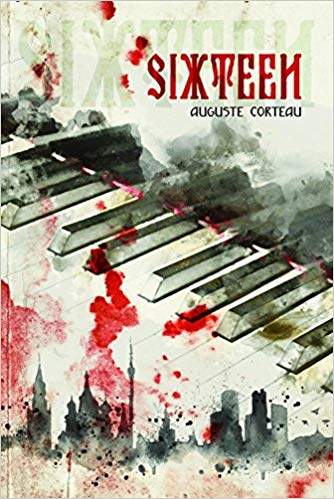
(Etruscan Press, 2019)
REVIEW BY ANN ANDERSON EVANS
—
Sixteen is a work that touches the fringes of magical realism while portraying a story that feels a hundred percent true. Perhaps that is because it takes place in Russia, a land of extremes and miracles. The quintessential Russian element of the story is that the fate of a piece of classical music can touch the national soul. That would never happen in America.
The characters in this story are full blown. They are foul-mouthed, self-destructive, sometimes fawning—but they carry the story on their strong, loveable shoulders. Corteau’s characters would be comfortable keeping company with the Dostoyevski brothers.
Brutal, earthy humor flashes throughout. “I never let the cleaning ogre into the study, so you’ll really be sitting on a plush layer of what I’m told is mostly defunct skin cells. Your disrespectful buttocks will be effectively lying on top of my dead body,” says Rabinovich. English speakers don’t say such things. Corteau has caught the Russian idiom in an enveloping embrace.
Without searching the archives, I wouldn’t know whether such men as Alexei and Rabinovich existed or whether the story told by Alexei bears any relationship to actual events, but it happens in the very real framework of the demise of the Soviet Union, and feels authentic.
The author writes that Alexei suffers from “taciturn dysphoria,” a Russian disease. It is the terror that followed every Russian in whatever station of life who lived under either the czars or the Communists. Every step Alexei takes is an anxious one: people are watching, threatening, undermining, maybe ultimately killing him. Death or the threat of it is such a constant companion that it loses its sting. One gets tired of fearing it when it is always just around the corner. Just Mother Russia folks, the “uncouth motherland.” Putin’s Russia doesn’t seem so different. Today’s America resembles it more than we like to acknowledge.
There are wild temporal and geographical plot swings, harking back to the shenanigans of Grand Duchesses and Czars of earlier days, traveling to the hoary and sumptuous environs of Switzerland, Florence, and elsewhere.
Alexei presents himself as a simple chronicler of his mentor’s life, but the author, an authority slightly higher than Alexei, slips in sly observations on human nature. “Kruschchev wasn’t as tall as photographs made him seem, but that had been true of Stalin as well. Power worked as slyly as elevator shoes.” Again, contemporary Americans take note.
Sixteen is the tale of a great love between mentor and protegé. Alexei is saved from death by being deprived of his mentor’s most closely held secrets and intentions, thus deceiving, misleading, and cheating him. A broken heart is exchanged for salvation. It is left to the reader to determine whether it was worth it.
I paired this book with Julian Barnes’s take on the life of Shostakovich, The Noise of Time. Shostakovich was also a survivor threading his way along the perilous peaks of cultural life under a vicious, greedy government that prized “social realism.”
None of these characters would be my preferred choice of company, but Corteau inhabits them, clothes them, listens to them with such close attention and compassion that, to sum up, I’d follow Alexei anywhere.
—
Ann Anderson Evans is the author of the award-winning memoir, Daring to Date Again (SheWrites Press 2014). Other work has been published widely in the literary and academic press. She enjoyed her eight years teaching freshman writing at Montclair State University , and continues to give writing workshops. Ann comes from Montclair, New Jersey, spent a decade in Europe, and now lives in Hoboken, New Jersey with her third and final husband.
![[PANK]](https://pankmagazine.com/wp-content/themes/pank/assets/images/pank-logo-large.png)
